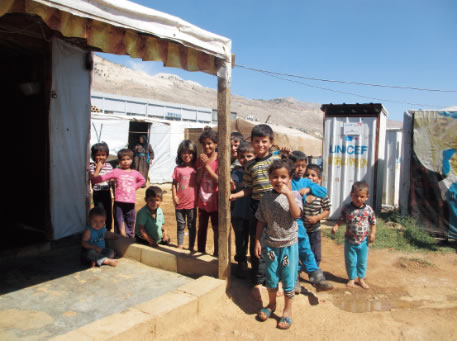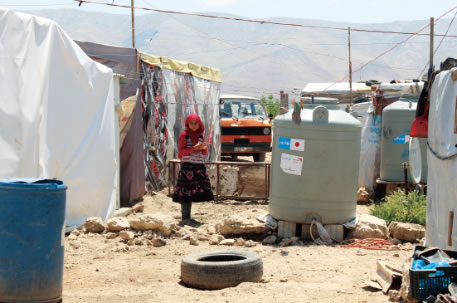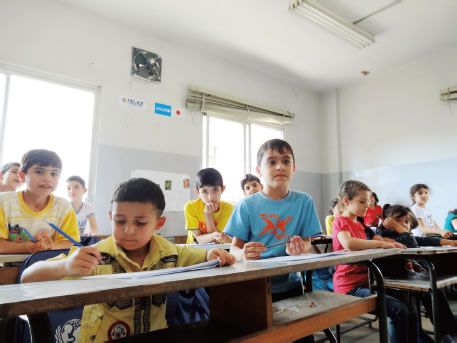2-2 Assistance for Ensuring Peace, Stability, and Security
(1) Peacebuilding Assistance
Regional and internal conflicts arising from ethnic, religious, and historical differences continue to pose challenges for the international community. Such conflicts generate a great number of refugees and internally displaced persons (IDPs), resulting in humanitarian crises and violations of human rights. Furthermore, these conflicts undermine the progress in development made through longterm efforts, and cause massive economic losses. Therefore, it is important for the entire international community to engage in “peacebuilding” in order to build foundations for development to prevent conflicts, avoid their recurrence, and consolidate sustainable peace.
<Japan’s Efforts>
Discussions on integrated support from the resolution of conflicts to recovery, reconstruction and nationbuilding have been held in fora such as the United Nations Peacebuilding Commission, which was established in 2005. Japan has contributed $46 million to the Peacebuilding Fund to date. Furthermore, Japan is making vigorous efforts from the perspective of “Proactive Contribution to Peace” based on the principle of international cooperation. For example, utilizing the United Nations, the importance of peacebuilding was confirmed at a high level, and in July 2016 Minister for Foreign Affairs Fumio Kishida went to New York and chaired an Open Debate of the UN Security Council on the theme of “Peacebuilding in Africa”. In addition, he stated, in the Pledging Conference for the UN Peacebuilding Fund in September the same year, that Japan would contribute about $10 million in the coming years.
Furthermore, Japan provides various types of supports, including assistance for refugees affected by conflicts, food assistance, and electoral assistance for political peace processes. After a conflict is resolved, Japan assists in Disarmament, Demobilization and Reintegration (DDR) of ex-combatants in order to promote the consolidation of peace. Japan also provides support to rebuild the security sector to ensure domestic stability and security. Japan extends support for the reconstruction of affected countries in such areas as the repatriation and resettlement of refugees and IDPs, and the rebuilding of basic infrastructure. Furthermore, in order to consolidate sustainable peace and prevent the recurrence of conflicts, Japan engages in efforts in social sectors such as healthcare and education as well as the reinforcement of administrative, judicial, and police functions, and the development of economic infrastructure and institutions. In such undertakings, maximum consideration is given to the importance of the roles that women can play in peacebuilding. In order to provide this support in a seamless manner, Japan also extends bilateral assistance through international organizations together with grant, technical cooperation, and ODA loans.
The Development Cooperation Charter outlines that Japan would strengthen coordination between development cooperation and international peace cooperation activities such as UN peacekeeping operations (PKOs). In the fields where UN PKOs are deployed, many initiatives are under way which contribute to development, including efforts for protecting refugees, women, and children affected by conflicts and developing basic infrastructure. To maximize their effects, it remains important that Japan promotes coordination among these activities.
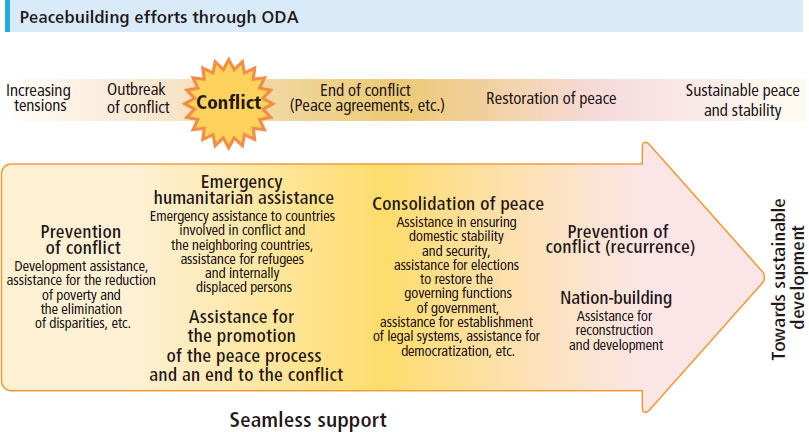
•Jordan
Capacity Development for Improvement of Livelihood for Palestinian Refugees (Phase 1)
Capacity Development for Improvement of Livelihood for Palestinian Refugees (Phase 2)
Technical cooperation project (Phase 1), individual experts (Phase 2)(June 2009-May 2012 (Phase 1), October 2013-September 2016 (Phase 2))

A woman holds a product manufactured at a refugee camp. (Photo: Shinichi Kuno / JICA)
Jordan has accepted the largest number of Palestinian refugees, with more than 2 million Palestinian refugees living there. In 1950 the Department of Palestinian Affairs (DPA) was established in the Ministry of Foreign Affairs of Jordan, and it has been implementing (1) supervision of refugees and forced emigrants, (2) follow-up on the activities and programs of United Nations Relief and Works Agency for Palestine Refugees in the Near East (UNRWA), (3) management inside the refugee camps, (4) follow-up of problems related to the Palestinians, (5) promotion of international cooperation, and (6) management of development projects within the camps.
Since January 2006, Japan has been dispatching JICA experts to the Training and Employment Center (hereinafter referred to as “TEC”) run by the DPA, which provides vocational training that enables refugees to get jobs and create cash income by conducting practice in job-search and entrepreneurship support. For instance, they instruct women in the Palestinian refugee camps on how to make perfumes and mushrooms to earn revenue in cash. They also provide job-search assistance to the refugees by offering opportunities such as job-matching, job orientation, and on-the-job training (OJT) at private sector companies. The DPA has been successful in improving capabilities to deal with challenges, and evaluate and monitor operational performances at the TEC.
In the entrepreneur support program, approximately 60% of the participants succeeded in earning cash income of approximately ¥4,000 a month on average. In the job-search support program, there were cases which actually led to participants gaining jobs, and in order to improve the retention rate further, Japan is revising the program and working to transform the refugees’ way of thinking through an Educational Activities and Behavioral Modification Program.*1
*1: This is a program that implements workshops, etc. for the refugees in Palestinian refugee camps with the objective of encouraging the understanding of women going out into society to participate in productive activities.
| Protection and Participation of the Socially Vulnerable
Socially vulnerable people include persons with disabilities due to conflict or landmines, orphans, widows, ex-combatants including child soldiers, and IDPs. Despite being susceptible to the impacts of conflict, the reality is that the socially vulnerable often receive delayed assistance in post-conflict recovery and often find it difficult to access the benefits of peace and reconstruction.
Japan’s Development Cooperation Charter also stipulated the importance of promoting the participation of women as a bearer of development and incorporated the viewpoints of consideration of the socially vulnerable such as children, persons with disabilities, the elderly, etc.
At the G8 Foreign Ministers’ Meeting held in April 2013, the G8 Declaration on Preventing Sexual Violence in Conflict was adopted in order to strengthen international efforts to remedy human rights violations against women in conflict-affected areas and prevent sexual violence. State Minister for Foreign Affairs Kishi attended the Global Summit to End Sexual Violence in Conflict held in London in June 2014, and he stressed the importance of women’s empowerment and their political, social, and economic participation.
In 2015 Japan also provided maternal health support for Syrian refugees, cooperating with a Japanese NGO.
With regard to needs such as the independence of persons with disabilities and support for social participation, Japan is engaged in empowerment through vocational training, etc. by persons with disabilities themselves who are dispatched overseas as experts.
Furthermore, for the social reintegration of child soldiers and protection and empowerment of children, who are in the most vulnerable in conflict-affected areas, Japan is providing support through UNICEF. For example, in Central Africa Japan contributes in funding to the project for Liberation of Children from Armed Groups and Support for their Social Integration through UNICEF.
In the G7 Ise-Shima Summit held in May 2016, womenrelated issues were discussed as one of the priority items on the agenda. The Summit focused on empowerment of women, including through education and training, promoting women’s active roles in the natural sciences and technology fields, etc. and agreed on the G7 Guiding Principles for Capacity Building of Women and Girls, and the Women’s Initiative in Developing STEM Career (WINDS). In addition, the importance of the participation of women in the processes of conflict prevention and peacebuilding was emphasized.
| Reconstruction of Social and Human Capital
Japan supports the reconstruction of social capital and restoration of human capital who participate in economic activities in countries affected by conflict. This support is aimed at preventing new conflict from emerging and eliminating factors that could cause new conflict before reconstruction or nation building.
The reconstruction of social capital largely requires five steps: (i) development of social infrastructure; (ii) development of transportation, power grids and telecommunications networks; (iii) improvement of medical system functions; (iv) improvement of education system functions; and (v) food security. As for the reconstruction of human capital, while combining assistance aimed at medium- to long-term economic development, Japan seeks to help develop an economic environment as well as increase job opportunities and improve livelihoods with a focus on preventing social instability caused by rising unemployment and other factors.
| Restoring Public Order and Government Functions
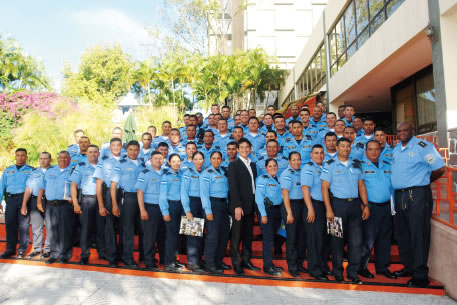
A staff member of the JICA Honduras Office, Mr. Tomoyuki Odani (center), and training participants at the closing ceremony of the Honduras Regional Police Project training (Photo: Yeni Mole / JICA Honduras Office)
Public safety and governance are extremely important when it comes to providing seamless assistance that spans from conflict resolution to recovery, reconstruction and nation-building. In this regard, Japan believes it is necessary to assist efforts in Disarmament, Demobilization and Reintegration (DDR) so that countries involved in conflict can consolidate peace and do not return to conflict. Additionally, Japan is working on efforts to ensure public safety and security, and to strengthen administrative, judicial, and police functions and to restore governance through the restoration of government systems and election reform.
As part of its election reform efforts, Japan announced that it would provide Cambodia with assistance in the form of (i) technical advice; (ii) dispatching experts; and (iii) provision of equipment. Japan has dispatched experts and proceeded with other specific cooperation since September 2015.
| Clearance of Landmines, Unexploded Ordinance, and Collection of Small Arms
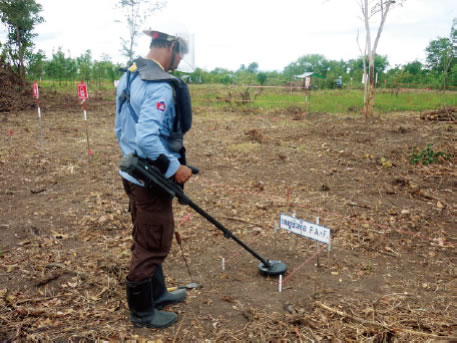
Site of landmine and UXOs removal as part of the Project for Improvement of Equipment for Demining Activities (Phase 7) in Cambodia (Grant Aid) (Photo: JICA)
In post-conflict countries, unexploded ordnance (UXO) including cluster munitions, which contain and eject multiple smaller submunitions upon detonation, and antipersonnel landmines remain, while illegal small arms are still widespread. These explosive remnants of war indiscriminately harm civilian including children. Not only do they hinder reconstruction and development activities, they can also become a cause of new conflicts. It is important to provide support towards stabilizing communities and ensure security in the affected country, through such assistance as the clearance of UXOs and landmines, the collection and disposal of illegal small arms, and assistance and empowerment for landmine victims.
As a state party to the Convention on the Prohibition of the Use, Stockpiling, Production and Transfer of Anti- Personnel Mines and on their Destruction, as well as the Convention on Cluster Munitions, Japan has been actively promoting the universalization of these conventions by working towards their ratification and accession by as many countries as possible. Japan is also steadily implementing international cooperation for mine action including mine clearance, victim assistance, mine risk education and other projects set forth in both conventions.
For example, the Japan Mine Action Service (JMAS), a specified non-profit corporation, helped to establish a new curriculum on demining skills at the Cambodian Mine Action Centre (CMAC) under the framework of the Grant Assistance for Japanese NGO Projects in 2014, which leads to enriching a solid footing for training on landmine clearance. Furthermore, CMAC demining platoons participating in this curriculum are learning to disseminate the technical expertise on mine clearance throughout Cambodia and neighboring countries.
In Afghanistan, the Association for Aid and Relief, Japan (AAR Japan), another specified non-profit corporation, provides outreach education to raise awareness on the dangers of landmines, UXOs and other remnants of conflict and on the proper ways to avoid them. Since FY2009, through the Grant Assistance for Japanese NGO Projects and JPF, (Note 22) AAR Japan has conducted Mine Risk Education (MRE) in various parts of Afghanistan with activities, including showing educational films in mobile cinemas. The organization has also trained local people to conduct MRE themselves. Through such activities, enlightenment activities for the local people are in progress.

Japan-made heavy machineries supplied to remove explosives in an area liberated from ISIL in the northern part of Ninewah, Iraq. They will be attached with armor and be utilized in the liberated area to support the early return of IDPs. (Photo: Yuta Aikawa / Embassy of Japan in Iraq)
In addition, from March 2015 onwards, Japan has provided support through UNICEF for outreach education on the risks of explosive and non-explosive elements of war in Palestine, Yemen, Central African Republic, Chad, South Sudan, Iraq, and Ukraine.
Furthermore, for Laos, which has endured particularly great suffering from UXO, Japan has mainly carried out the dispatch of UXO experts, provision of equipment, and South-South cooperation, and from 2014 it has supported capacity building of organizations that dispose of UXOs. In addition, from 2015 Japan has carried out the mechanization of shrub removal and development of advance bases in Sekong Province, Saravan Province and Champasack Province, poor regions which have endured particularly great suffering from UXO, and supports the development of land after the clearance of UXO.
In 2016, Japan has supported countermeasures against landmines and UXO, including removal and risk prevention education, through United Nations Mine Action Service (UNMAS) in Afghanistan, South Sudan, Somalia, the Democratic Republic of the Congo, Palestine (Gaza district), and Syria. Particularly, in South Sudan, Japan provided assistance in coordination with the Japan Self- Defense Force personnel performing PKO operations. Additionally, through the Japan-UNDP Partnership Fund, Japan is supporting a training project to manage small arms for officials from the security agencies in Liberia conducted by the Kofi Annan International Peacekeeping Training Centre in Ghana.
To tackle proliferation of small arms and light weapons, Japan provides support for the projects of collection, disposal, and stockpile management of small arms, through development assistance. With a view to improving security as well as strengthening the capacity to supervise the import and export of weapons, Japan also supports the development of relevant legal systems on arms control, capacity building of customs agencies, police forces and other law enforcement agencies, and support for conducting DDR projects for ex-combatants and child soldiers.
| Human Resources Development for Peacebuilding
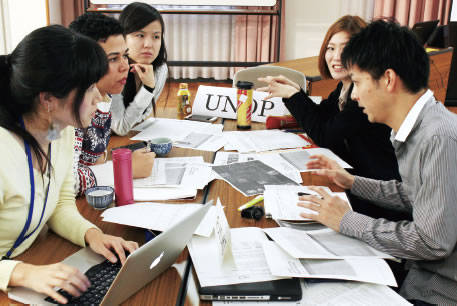
Participants have a discussion during the coursework of the “Program for Global Human Resource Development for Peacebuilding and Development.” (Photo: Hiroshima Peacebuilders Center)
Required qualities for peacebuilding activities and those that are engaged in such activities, are becoming more diverse and more complex. In response to these needs on the ground, Japan has conducted the Program for Human Resource Development for Peacebuilding from FY2007 to FY2014 to train civilian experts from Japan and other regions so that they can play an active role in the field. Pillars of the Primary Course program consist of the coursework in Japan, where participants acquire the practical knowledge and skills required for the peacebuilding field; the overseas assignment, where participants work at local offices of international organizations in the peacebuilding field; and support for graduates to build up their careers. To date, 302 trainees from Japan and other countries have participated in the training courses. Many program graduates are now actively working in the field of peacebuilding in those countries such as South Sudan, the Democratic Republic of the Congo and Afghanistan. Since FY2015, the content of the program has been expanded and is now called “the Global Program for Human Resource Development for Peacebuilding and Development.” In addition to the existing Primary Course, the Mid-Career Course and the Career Support Seminar are also being conducted.
- Note 22: JPF is an organization launched by NGOs, business communities, and the Government of Japan in August 2000 in order for Japanese NGOs to carry out expedient and effective emergency humanitarian assistance in response to conflict or natural disasters.
A. Mindanao Peace Process
The conflict between the Government of the Philippines and Islamic rebel groups continued for 40 years in the Mindanao region in southern Philippines. To put an end to this history, the government and the Moro Islamic Liberation Front (MILF) engaged in peace talks from 2001. On March 27, 2014, a comprehensive peace agreement was signed between the two parties, marking a large step towards fundamentally resolving the Mindanao conflict.
Under this agreement, during the transition process until the inauguration of the new autonomous government (Bangsamoro (Note 23)), the Bangsamoro Basic Law is to be enacted, a referendum is to be held, and a transitional governing entity is to be established. At the same time, various processes that are expected to contribute to the “normalization” of the situation have to be implemented smoothly, including the disarmament of MILF forces, the social reintegration of combatants, the dismantlement of the many private armed groups in the area, the restoration of security by creating a new police organization, and the promotion of socio-economic development which has lagged behind due to the conflict.
The steady execution of the peace agreement and whether or not the hurdles can be overcome will be key to achieving true peace in Mindanao. This requires the unremitting efforts of the Philippine government and MILF, as well as the support of the international community, including Japan.
<Japan’s Efforts>
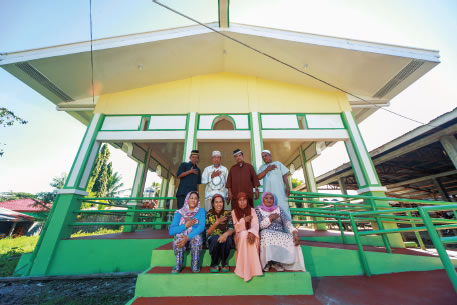
A multi-purpose hall constructed as part of the "Comprehensive Capacity Development Project for the Bangsamoro". It promotes peacebuilding in the conflict affected region of Mindanao. (Photo: Hervey Tapan / Third Eye Visual)
Based on the belief that peace in Mindanao will lead to peace and stability in the region, Japan has extended its support to the peace process for years. For example, Japan dispatched development experts from JICA to the Social and Economic Development Section of the International Monitoring Team (IMT) and conducted studies to identify the needs for assistance. This led to Japan’s assistance for the development of elementary schools, wells, clinics, and vocational training centers. Japan has also carried out development cooperation projects intensively in former conflict areas, including Grant Assistance for Grass-Roots Human Security Projects. These measures which are known under the name of the “Japan-Bangsamoro Initiatives for Reconstruction and Development (J-BIRD)” are highly praised by the local people and the Philippine government. Furthermore, Japan is a member of the International Contact Group which participates in the peace talks as an observer and offers advice, and contributes to the advancement of the Mindanao Peace Process. In August 2011, the first leaders’ meeting between then President Benigno S. Aquino III and MILF Chairman Al Haj Murad Ebrahim took place in Narita by the intermediation of Japan. This meeting helped establish mutual trust towards the resolution of the Mindanao peace issue.
After signing the Comprehensive Agreement on the Bangsamoro (CAB) in March 2014, JICA organized the Consolidation for Peace for Mindanao Seminar in Hiroshima City in June 2014. With then President Aquino in attendance, officials including MILF Chairman Murad and Secretary Teresita Quintos-Deles of the Office of the Presidential Adviser on the Peace Process (OPAPP) participated and stated their resolve towards moving the peace process forward. During then President Aquino’s stay in Japan, the Government of Japan announced the transition to the framework of “J-BIRD 2” with a greater focus on securing the economic independence of the Bangsamoro region. Japan continues to expand and strengthen its support for the achievement of true peace in Mindanao based on the pillars of: construction of schools, clinics, wells, and other facilities; human resources development in the transition process; and economic development towards sustainable development (cooperation focused on agriculture, mining and manufacturing, infrastructure development, etc.).
In addition, Japan supports the peacebuilding process undertaken by Japanese NGOs using the Grant Assistance for Japanese NGO Projects. For example, the International Children’s Action Network (ICAN), a specified nonprofit corporation has been conducting mediation training between the parties of the conflict on the island of Mindanao in the Philippines as part of efforts to consolidate peace at the local grassroots level for three years since FY2014. Furthermore, from February 2016 a project to strengthen capacity to solve educational issues in the Bukidnon indigenous people’s region was started on the same island of Mindanao.
- Note 23: “Bangsamoro” is the name which Islamic rebel groups use to refer to themselves.
B. Assistance to Afghanistan and Pakistan
The prolonged unstable situation in Afghanistan and Pakistan is a challenge, not only for them and the neighboring areas, but also for the peace and stability of the entire world. Japan and the international community actively support Afghanistan to prevent the country from stepping back into being a hotbed for terrorism. The National Unity Government led by the President Ashraf Ghani which was inaugurated in September 2014 has been continuing reform efforts towards self-reliance and stability of the nation with the support of the international community. However, Afghanistan has been facing many challenges, including a worsening security situation due to intensified offensives by anti-government insurgents, such as the Taliban, exacerbation of the economy and employment, and delays in anti-corruption measures and elections. Furthermore, efforts by the National Unity Government to advance the reconciliation process with the Taliban by utilizing the framework of the Quadrilateral Coordination Group with Pakistan, the United States, and China (held five times since January 2016) have achieved only insufficient outcomes. Moreover, in June 2016 armed clashes between Afghanistan and Pakistan occurred in their border areas, which highlight the importance of efforts to resolve the issues of concern between the two countries and steps by Pakistan to achieve stability in Afghanistan.
<Japan’s Efforts>
| Afghanistan
Japan has consistently extended assistance to Afghanistan. Japan’s assistance to Afghanistan since October 2001 totals approximately $6.2 billion (as of early September 2016). Japan, as one of the major donor countries for Afghanistan, has been and is endeavoring to cooperate with the government of Afghanistan and other donor countries and organizations.
Japan and Afghanistan jointly held the Tokyo Conference on Afghanistan on July 8, 2012. The conference, attended by representatives of about 80 countries and international organizations, issued an outcome document titled “The Tokyo Declaration.” At the conference, the Tokyo Mutual Accountability Framework (TMAF) was established to clarify the mutual commitment between Afghanistan and the international community for the sustainable development of Afghanistan and to regularly monitor and review the commitment. On that occasion Japan announced that it would provide up to approximately $3 billion of assistance to Afghanistan in about five years from 2012 in the fields of development and enhancement of security capabilities. Since 2012, Japan has extended approximately $2.8 billion of assistance to Afghanistan by the end of August 2016.
At the London Conference on Afghanistan held in December 2014, the international community and Afghanistan’s commitment under TMAF was reaffirmed, while the need to further follow up on this framework was confirmed as well. At the Senior Officials Meeting for Follow-up of Tokyo Conference on Afghanistan held in Kabul in September 2015, the Self-Reliance through Mutual Accountability Framework (SMAF) was established as the new framework to succeed TMAF, in line with the priority matters cited by the current Afghan administration. This confirmed that Afghanistan and the international community would tackle the issues faced by Afghanistan under the principle of “mutual accountability.”
The Brussels Conference on Afghanistan held in October 2016 was an important opportunity to renew the existing mutual commitments between the international community and the Government of Afghanistan, and Japan expressed its intention to continue assistance worth up to ¥40 billion per year for four years starting from 2017 to the end of 2020, and strongly urged Afghanistan to make efforts for further reform commitments.
In order to support Afghanistan’s efforts towards self-reliance and stability, Japan’s current support puts the priority on the capacity building of the police in the security field, agriculture development, human resources development, and transportation infrastructure development in the development field.
| Pakistan
Japan has been actively engaged in assisting Pakistan since Pakistan announced its intention to fight against terrorism in cooperation with the international community following the terrorist attacks in the United States in 2001. In April 2009, Japan hosted the Pakistan Donors Conference and pledged assistance of up to $1 billion(Note 24) to Pakistan over two years, which is being steadily implemented. In 2014, Japan extended a ¥5 billion ODA loan to support energy sector reform by Pakistan.
To contribute to the improvement of the security situation in Pakistan, Japan has been providing assistance for education, health, vocational training, and other projects in the Pakistan-Afghanistan border area, and supporting Pakistan’s efforts to bring stability to people’s lives. In 2013, Japan extended assistance of approximately ¥2 billion for counter-terrorism measures in Pakistan in order to improve airport security capabilities at major international airports in Pakistan, including for the installation of X-ray inspection equipment. In 2015, Japan provided approximately ¥1.3 billion in assistance through UN organizations for IDPs following the implementation of counter-terrorism military operations. At the same time, in order to strengthen border control capacity against illicit drug trafficking and transnational organized crime in the border region of Afghanistan and Iran, Japan provided ¥768 million in grant aid through UN agencies. Furthermore, in 2016, Japan provided ¥200 million in grant aid as funds to purchase equipment and products in the peacebuilding, humanitarian assistance and counterterrorism fields.
- Note 24: Includes aid for flooding in FY2010.
C. Middle East Peace (Palestine)
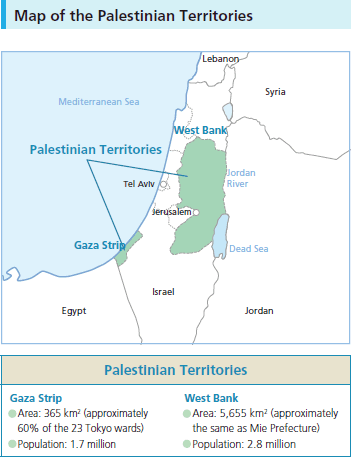
The Palestine issue is at the core of the Arab-Israeli conflict that has continued for more than half a century. Middle East peace is an issue that wields significant impact on the stability and prosperity of Japan and the rest of the world. Japan supports a two-state solution whereby Israel and a future independent Palestinian state live side by side in peace and security. To promote this, it is essential to prepare for nation-building through socioeconomic development of Palestine, which is one of the parties of the peace process. Since the establishment of the Palestinian Interim Self-Government Authority based on the Oslo Accords in 1993, the international community including Japan has been proactively extending assistance to the Palestinians.
Although Palestinians continue to feel significant discontent and antipathy towards the Israeli occupation, many years of occupation have made them economically dependent on the Israeli economy as well as on aid from the international community. These circumstances make the achievement of Middle East peace even more difficult. Israel’s occupation policy and widening regional disparities and a high unemployment rate driven by the sluggish economy are destabilizing factors in regional circumstances. Helping the Palestinian economy stand independently while improving living conditions for its people is the most important challenge in creating an environment where Palestinians can negotiate with Israelis for genuine peace.
<Japan’s Efforts>
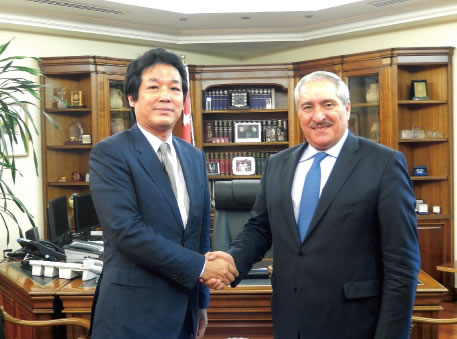
State Minister for Foreign Affairs Kentaro Sonoura visited Jordan in September 2016 and exchanged views on the "Corridor of Peace and Prosperity" with Mr. Nasser Judeh, Deputy Prime Minister and Minister of Foreign Affairs and Expatriates of the Hashemite Kingdom of Jordan.
Based on the perspective that “peacebuilding” is one of the priority issues of development cooperation, Japan has positioned its assistance to the Palestinians as one of the important pillars of its measures to contribute to the Middle East Peace Process. In particular, Japan, as one of the major donor countries along with the United States, the European Union (EU), and other countries, has provided $1.7 billion in total to the Palestinians since the 1993 Oslo Accords. Specifically, Japan provides various types of humanitarian assistance through international organizations and NGOs, to improve the severe living conditions of the socially vulnerable people in the West Bank (including East Jerusalem), people affected by conflicts in the Gaza Strip, and others. Also, Japan proactively supports the Palestinian Authority to stabilize and improve its people’s lives, enhance the administrative and financial capacity, and promote sustainable economic growth. These efforts are aimed at preparing for future Palestinian nation-building and for a self-sustained Palestinian economy.
Furthermore, since July 2006, Japan has launched the initiative of “the Corridor for Peace and Prosperity,” as its unique medium- to long-term effort for future peaceful coexistence and co-prosperity between the Israelis and the Palestinians. The initiative aims to promote socio-economic development in the Jordan Valley area through regional cooperation among the four parties of Japan, Israel, Palestine and Jordan. Those four parties are working on the flagship project of the initiative, the establishment of an agro-industrial park in the suburbs of Jericho City.
In 2013, Japan launched a new initiative called the “Conference on the Cooperation among East Asian Countries for Palestinian Development (CEAPAD)” to help Palestine achieve economic independence by drawing on Asia’s experience on human resources development and private economic development. In March 2014, the second ministerial meeting was held in Indonesia. In addition, to date, meetings have been held on triangular cooperation (Note 25) for human resources development and on trade and investment expansion.
In January 2015, Prime Minister Abe visited Palestine where he met with President Mahmoud Abbas and conveyed that Japan would extend approximately $100 million in assistance to aid reconstruction in Gaza, socio-economic development, finance, and medical and healthcare, among other areas.
On the occasion of the United Nations General Assembly in September 2015, the Middle East Quartet Outreach Meeting on peace in the Middle East was held, with the participation of the five permanent members of the United Nations Security Council, major Arab countries, several European countries, and Japan. At the meeting, Foreign Minister Fumio Kishida announced approximately $12 million in new assistance. This assistance will support the socio-economic development of Palestine.
In February 2016 President Mahmoud Abbas visited Japan and Prime Minister Abe conveyed that Japan would extend new assistance to Palestine of more than $78 million, and President Abbas expressed his utmost gratitude.
- Note 25: South-South cooperation (Triangular cooperation)
South-South cooperation refers to cooperation provided by relatively advanced developing countries to other developing countries, utilizing their experiences in development and their own human resources. In many cases the cooperation, primarily technical cooperation, is conducted in countries that have similar natural environments and cultural and economic circumstances, facing similar development challenges. Support by donors or international organizations for cooperation between developing countries is referred to as “triangular cooperation.”
•Iraq
Third Country Training Program on Mine Action
Technical cooperation project (June 2016 – )
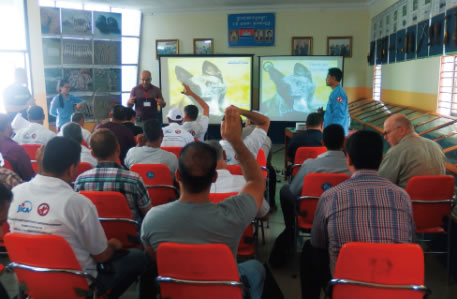
Training Program on Mine Action: CMAC-Training Institute Training Course (Photo: JICA)
As a result of past wars and the ongoing fight against the Islamic State of Iraq and the Levant (ISIL), it is estimated that approximately 65 million landmines and other unexploded ordnances (UXOs) are buried in Iraq. With the affected area covering 1,730 square kilometers and the lives of about 1.6 million people affected, the explosive remnants of war (ERWs) impede the social and economic development of Iraq.
To tackle this issue, the Government of Iraq established the Directorate of Mine Action (DMA) within the Ministry of Health and Environment in 2008, and the Kurdistan Regional Government established the Iraq Kurdistan Mine Action Agency (IKMAA) in 2012. However, since they were a newly established organization they were not necessarily equipped with sufficient demining techniques and operational and practical capabilities as an organization, and capacity building of staff members was an issue.
Moreover, as the regions occupied by ISIL are gradually being liberated by the Iraqi armed forces, the landmines and UXOs buried in great numbers by ISIL in those areas are becoming one of the biggest causes impeding the return of displaced people to their homes and the restoration of destroyed towns.
Upon receiving a request from the Iraqi Prime Minister Haider Al-Abadi on landmine clearance, Japan has been offering third country training programs in Cambodia to the personnel of DMA and IKMAA. The Programs include training on demining and clearance methods for landmines, prevention measures and others. The institution in Cambodia where the training is conducted had long received support from the Government of Japan in the area of demining and mine-action activities and is now equipped with ample experience and techniques.
As Iraq faces long-term challenges to tackle the issue of ERWs, the collaboration with the institution in Cambodia is not only invaluable for Iraq from the capacity building perspective, but also is a good example of South-South cooperation (triangular cooperation)*1. (As of August 2016)
*1: See Note 25.
E. Sahel Region
The “Sahel (Note 26) countries” generally include the following eight countries – Mauritania, Senegal, Mali, Burkina Faso, Niger, Nigeria, Cameroon and Chad, although there is no strict definition.
Due to natural disasters such as drought, as well as poverty and weak state function, issues of political uncertainty, terrorism, illicit trade of arms and illegal drugs, and the threats of organized crimes such as kidnapping are becoming ever more serious in the Sahel region. Moreover, countries in the Sahel region, which have vast lands including deserts, have difficulties in controlling their borders sufficiently to prevent the entry and exit of terrorists and others, so the region is also a breeding ground for arms smuggling. Under these circumstances, it is necessary for the region and the international community to improve security capacity and strengthen governance to avoid the whole Sahel region from becoming a lawless zone. They also put a high priority on dealing with humanitarian crises, such as the refugee issue, and to promote development.
<Japan’s Efforts>
Following the terrorist attack against Japanese nationals in Algeria (Note 27) in January 2013, Minister for Foreign Affairs Fumio Kishida announced the three pillars of foreign policy (Note 28) on January 29 the same year. In addition, at TICAD V in June 2013, Japan pledged to continue providing support for the consolidation of peace, including ¥100 billion in development and humanitarian assistance. Furthermore, Japan announced three new pillars of diplomatic policy (Note 29) to address the more frequent occurrence of terrorism, following the hostage crisis in February 2015 in which two Japanese nationals were killed, and Japan has been accelerating its efforts to bring peace and stability to the Sahel region.
In 2016, Japan pledged to extend $7.2 million to help Mali refugees and implemented such assistance as providing food, promoting peace education, and vocational training for refugees who returned to Mali from neighboring countries and providing vehicles to support the strengthening of police patrols in the capital Bamako.
Moreover, Japan has implemented projects which contribute to the peace and stability in the Sahel region such as border control to enhance stability of the region, a plan to enhance human security, support for countermeasures against radicalization of the youth, and awareness raising for civic rights.
These assistance projects strengthen border control capacity and prevent young people from turning to violent extremism. As a result, the projects are expected to improve public safety and reduce the threat of potential terrorist attacks in the Sahel countries, and by extension, improve the ability of the whole region to cope with these challenges.
The Ministry of Justice (MOJ), through UNAFEI, organized a training program for criminal justice practitioners in French-speaking African countries, which was called the Third Training on Criminal Justice in French-speaking African Countries. This program focused on themes such as improving investigations, legal actions, and trials as well as measures to combat terrorist crimes and measures against organized crimes. This training will contribute to the enhancement and development of the criminal justice system in French-speaking African countries, and thereby address such global challenges as the deteriorating security situation and the serious issues of corruption in this region.
Japan will work more closely with countries in the Sahel region, international organizations, and other aid organizations to provide assistance steadily towards establishing peace and stability in the Sahel region.
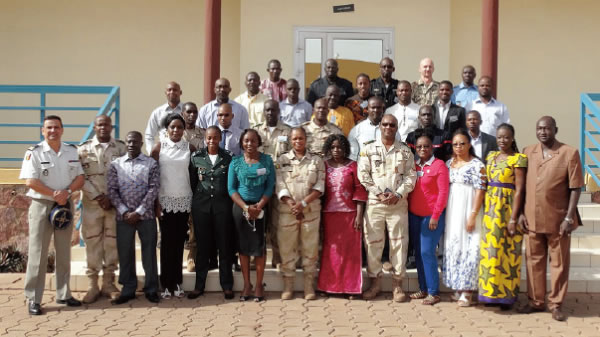
Trainees in crisis management, peace and stability training implemented at the Mali PKO training Center (Photo: Mali UNDP Secretariat)
- Note 26: “Sahel” is a semi-arid region that stretches along the southern edge of the Sahara desert. It generally refers to part of West Africa; however, in some cases it includes Sudan and the Horn of Africa area. The word “Sahel” originated from “coast” in Arabic. The Sahel countries are also called the countries at the southern edge of the Sahara Desert.
- Note 27: This is an incident in which an armed group attacked a natural gas plant in the Tiguentourine area in eastern Algeria and barricaded the inside of the plant, taking the workers and other people as hostages. The Algerian military forces managed to control the situation by January 19. However, 40 people died, including 10 Japanese nationals.
- Note 28: The three pillars are: (1) Strengthening of measures against international terrorism; (2) Support for the stabilization of Sahel, North Africa, and Middle East regions; and (3) Promotion of dialogue and exchange with Islamic and Arab countries.
- Note 29: The three pillars are: (i) Strengthening counter-terrorism measures; (ii) Enhancing diplomacy towards stability and prosperity in the Middle East; and (iii) Assistance in creating societies resilient to radicalization.
F. South Sudan
In South Sudan, conflict continued between the government and a faction supporting former Vice President Riek Machar Teny since December 15, 2013, leading to the deterioration of the humanitarian situation, including the rise in the number of IDPs and refugees. The Inter- Governmental Authority on Development (IGAD), comprised of neighboring countries, played a role as a mediator and in August 2015, President Salva Kiir Mayardit, former Vice President Machar, and other relevant parties signed the Agreement on the Resolution of the Conflict in South Sudan, which immediately took effect. In April 2016 former Vice President Machar returned to South Sudan and was sworn in as the First Vice President, and the Transitional Government of National Unity stipulated in the Agreement was established. However, in July the same year, clashes broke out in Juba between the faction supporting President Kiir and the faction supporting then First Vice President Machar, and security in Juba rapidly deteriorated. As result, Japanese nationals, including the JICA staff evacuated from the country. Subsequently, the capital Juba became relatively calm, but the regions remain volatile due to clashes between the government forces and the opposition forces and deterioration of the economy and the country is faced with remaining multiple challenges.
<Japan’s Efforts>
Peacebuilding is one of the priorities of Japan’s diplomacy towards Africa. In particular, stability in Sudan and South Sudan is directly related to the stability of the whole African continent. The two countries are therefore an area in Africa requiring intensive assistance for the consolidation of peace. With this understanding, Japan has provided assistance amounting to over $1.5 billion to Sudan and South Sudan since 2005.
Japan continues to support the consolidation of peace through DDR of ex-combatants and lend assistance in fields dealing with basic human needs (BHN) (Note 30) so that the people of the two nations can actually feel that peace has been established and do not revert to conflict. Concretely, Japan provides Sudan with the support focused on meeting BHN and improving a food production base mainly in the regions affected by conflict. To South Sudan, in addition to the aforementioned support, Japan’s assistance has focused on development of infrastructure and governance.
At present, Engineering Units of the Japan Self-Defense Force (JSDF) have been dispatched to the United Nations Mission in the Republic of South Sudan (UNMISS). Japan is also implementing development and humanitarian assistance projects in coordination with the engineering units’ activities so that Japan can put forth its effort for stability and nation-building in South Sudan in an integrated manner. In 2013, the Unit implemented the “Project for the Rehabilitation of Juba Na-Bari Community Road” in coordination with a Grant Assistance for Grass-Roots Human Security Project. The Unit constructed a perimeter security fence for the port where the “Project for Improvement of Juba River Port” is being implemented by JICA using grant aid to the South Sudan capital of Juba. The engineering unit is currently building facilities inside the Protection of Civilian sites due to the deterioration of the security situation since December 2013. Furthermore, by assisting UNMAS, which is removing landmines and other hazards in areas where UNMISS is active, Japan is helping to facilitate the implementation of UNMISS operations, of which JSDF is a part (As of November 2016).
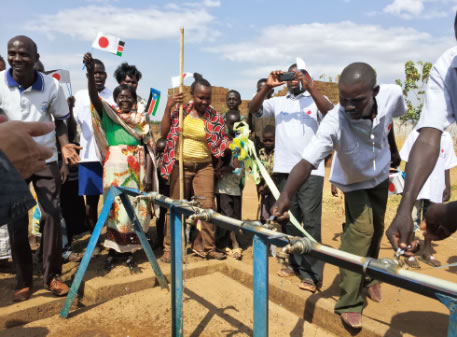
A project to support water and sanitation facilities for communities accepting internally displaced people through collaboration between Japan and UN-Habitat in South Sudan. The handover ceremony of the facility to the local community was held in December 2016.
- Note 30: Basic human needs are the minimum requirements to make a living including clothing, food, shelter, and education.

